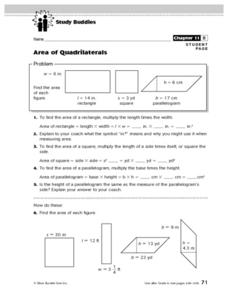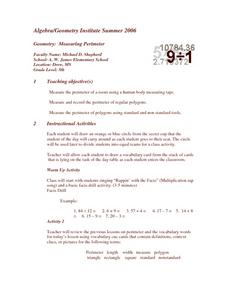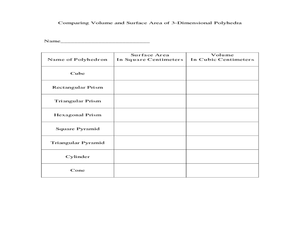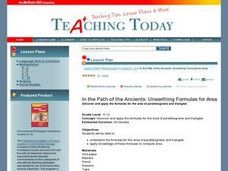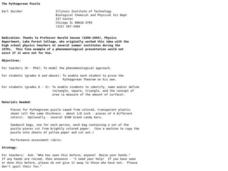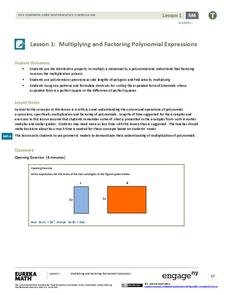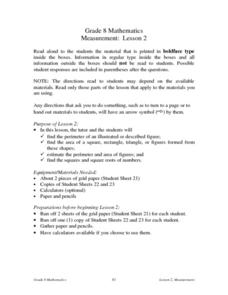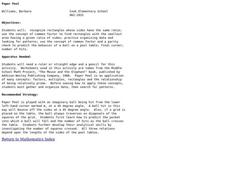Curated OER
Cut It Out!
Learners calculate the surface area of polygons. In this geometry lesson, students use spacial reasoning to find the answer to their problem. They analyze solids and create formulas to estimate the measurements of the area.
Curated OER
Linear/Planar Geometry - Week 5
In this linear and planar geometry worksheet, students use the Pythagorean Theorem, equation of a line, slope of a line and area formulas to solve problems. This three-page worksheet contains seven problems.
Curated OER
Tukutuku Patterns
Students complete a series of lessons involving Tukutuku patterns, their rotations and area formulae. They determine the algebraic formulae for sequences. They use images as they work through the lessons to find the number of crosses in...
Curated OER
Money Math
Students explore a story about a room decoration activity to learn about measurements and area. In this measurement lesson, students listen to a story about a boy who is redecorating his bedroom. Students discuss the story and work in...
Curated OER
Area of Quadrilaterals
In this math worksheet, learners read an informative chart about how to find the area of quadrilaterals. Students then answer 6 questions in which the area of quadrilaterals is calculated.
Curated OER
You Can Count on Squares!
Fourth graders engage in and explore to develop mathematical, specifically algebraic, ideas. Although the tasks are built around measurement, they are algebraic to the extent that they require 'formulae' to be derived form the geometric...
Curated OER
Squaring a Binomial Lesson
Young scholars practice squaring binomials. For this Algebra I lesson, the students use the "Square of Fun" to experience a concrete visualization of the process of squaring a binomial. The lesson assumes that young...
Curated OER
Mondrian: Rectangles, Squares, & Balance, Oh My!
Learners investigate the art of Piet Mondrian. They conduct Internet research, discuss Mondrian's artwork, play a computer game, and create an original work of art using Appleworks 6.
Curated OER
Measuring Perimeter
Have your class practice measuring the perimeter of various objects using this resource. Fifth graders place various-sized polygons in order (from largest to smallest). They use non-standard measuring tools to estimate the distance...
Curated OER
Measurements in Quilting
Student measure the length of the sides of rectangles and squares using inches, feet and yards. They determine perimeters of rectangles and squares. They then determine areas of rectangles and squares.
Student compare measurement of...
Curated OER
The Value of Volume
Students measure the perimeter and area of their polygons. In this geometry lesson plan, students calculate the volume and area using the correct tools. They calculate the time and temperature and the perimeter and side lengths of...
Curated OER
Introducing Powers and Models
Young scholars construct two dimensional models to illustrate squared numbers. For this geometry lesson, students use graph paper and an x/y axis to build squares exponentially. Young scholars identify powers and relationships between...
Alabama Learning Exchange
Dog Gone Again!
Here is a real-life lesson! Learners must plan the dimensions of a rectangular fence to reign in a runaway dog. They survey what shape and size fence is needed and use formulas to find perimeter and area of the fence. They explore what...
Curated OER
In the Path of the Ancients: Unearthing Formulas for Area
Young scholars apply the formulas for the area of parallelograms and triangles. Through guided practice, students discover the correct way to apply the formulas. Working in pairs, they write their own problems featuring the formulas.
Curated OER
Quadrilateral Attributes
Students classify quadrilaterals. In this quadrilateral lesson, students identify the characteristics of quadrilaterals. They write their findings in a journal. Students use geoboards to create quadrilaterals from given descriptions.
Curated OER
Amazing Transpiration
Learners observe a leaf and discuss the way that water is released from a leaf through its stomata. For this water cycle lesson, young scholars calculate how much water leaves produce from a whole tree.
Curated OER
Measuring with Mathematics
Eighth graders discover how the change in the dimensions of a shape cause a change in the overall area of the shape, but the perimeter stay the same. They, in groups, go out to the playground and construct large areas using stakes and rope.
Ohio Department of Education
Describing and Creating Plane Figures - Grade One
Young mathematicians draw, create, and describe different shapes using triangles. They discuss attributes of the original and created shapes. Pupils classify the created shapes and draw and write in mathematics journals to communicate...
Curated OER
The Pythagorean Puzzle
An engaging hands-on activity is presented. Learners of all ages are addressed in thie unique plan. K-5 learners identify, name, and define a rectangle, square, triangle, and the concept of area. Older learners prove the Pythagorean...
EngageNY
Multiplying and Factoring Polynomial Expressions (part 1)
Polynomial multiplication and factoring go hand in hand. Why not teach them together. This resource begins with an area model for distributing a monomial and then connects the process to factoring the GCF. Learners then advance to...
Curated OER
Count the Squares and Compare
Fourth graders construct squares and rectanges in order to help them find areas and perimeters. They gain an understanding of area and perimeter through teacher modeling and then they construct squares and rectangles.
Curated OER
Geometric Figures
Students compare, classify and calculate the area of geometric figures such as rectangles, squares, circles and triangles.
Curated OER
Measurement: Lesson 2
Fourth graders find the perimeter of a geometric shape by adding the lengths of the sides. They find the area of a square or rectangle by counting square units. Students use multiplication to find the area of a rectangle. They estimate...
Curated OER
Paper Pool
Students analyze the measurements of rectangles. In this analysis lesson, students will investigate patterns by looking at ratios. Students will also hypothesize the probability of a ball going into a certain pocket when playing pool....




